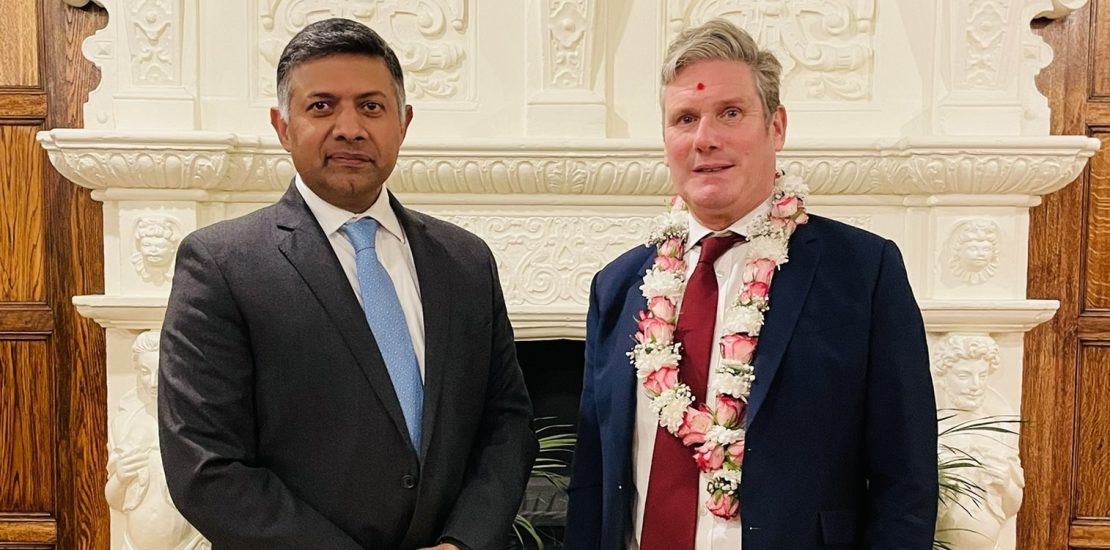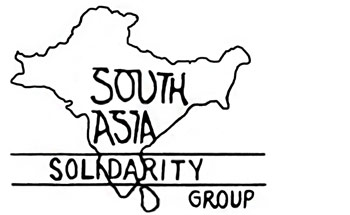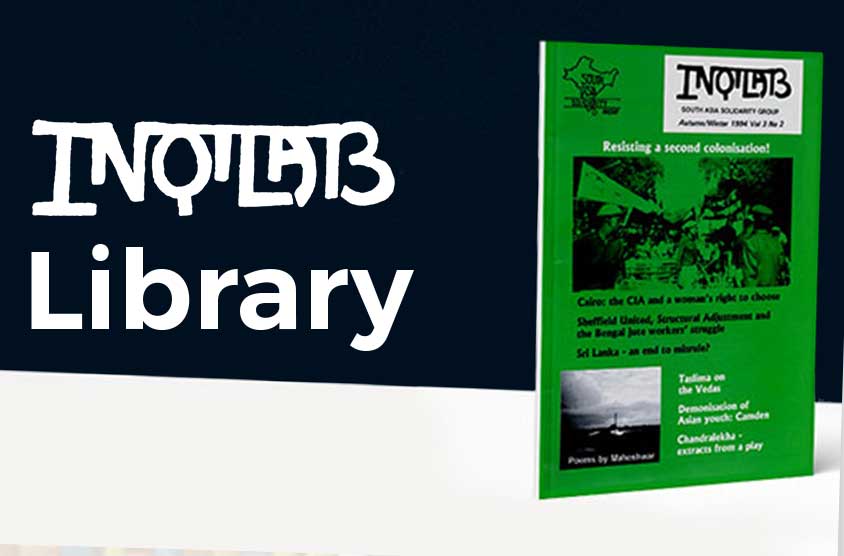Keir Starmer, Indians Face Racism, Not “Hinduphobia” – it’s a myth used to justify fascism
- October 12, 2022
- Posted by: kevbha
- Category: News

Featured image: Keir Starmer meeting the Indian High Commissioner on Monday 10 October.
We are deeply concerned by Keir Starmer’s speech at the Navratri celebration at India Gardens, London on Wednesday 5 October. In particular, Starmer’s direct reference to ‘Hinduphobia’ in this speech, in the wake of the communal violence on the streets of Leicester and Birmingham last month, is deeply disturbing.
This is not the first time we have warned Starmer about the dangers of pandering to the Hindu Right in the UK. In May 2020, soon after being elected Labour leader, Starmer had written to the Hindu Forum of Britain (HFB), an organisation which is closely aligned with the BJP government. This was apparently a misguided attempt to improve relations with the Indian community (who, importantly, are far from all being supporters of the Hindu Right) in the UK, and distance himself from his predecessor Jeremy Corbyn’s supposedly ‘anti-India stance’. This included Corbyn passing a motion to bring the issue of India’s siege on the region Jammu and Kashmir to the United Nations. The Conservatives have well-established links with the Hindu Right both in India and in the UK; this was Starmer’s first attempt to shift Labour in the same direction.
The HFB had mentioned ‘Hinduphobia’ in their response to Starmer, comparing this essentially fabricated concept to the very real, historically rooted and ongoing problem of anti-Semitism. Two years on from this correspondence, Starmer is not only in contact with such Hindu Right organisations but has now adopted their language and wider narratives in his own rhetoric. Starmer’s seemingly deepening relationship with the Hindu Right is against a backdrop of escalating communal violence in the UK akin to that which has become commonplace across many parts of India under the Modi regime.
Starmer’s use of the term ‘Hinduphobia’ is dangerous not only because of its far-right origins in India – as a fabricated concept, as mentioned – but also because of how it invokes Western far-right ideology. The use of the term has been compared to ‘White Lives Matter’, a white supremacist, racist response to the Black Lives Matter movement, which has grown into a Neo Nazi movement of its own. The key idea behind ‘Hinduphobia’ – that the Hindu majority in India are under systemic attack from minorities – is akin to this casting of white people in a Western context. Both are used as an excuse for, and in response to resistance against, racist and fascistic attacks on minority communities and marginalised people.
However, the term ‘Hinduphobia’ has been used quite differently in the UK, as synonymous with racism faced by Indians. Hindu Right groups in the UK – such as Hindu Human Rights, in a letter to Starmer – have used the racism faced by Indian communities in the UK since the mid 20th century to argue that Hindus have in fact long been persecuted as Hindus. This letter suggested that the previous Labour leadership’s support for self-determination for Kashmir is a continuation of this persecution. And yet, even left-wing MPs that have consistently condemned the Modi government – including Jeremy Corbyn – were persuaded last year to sign an early day motion which casts ‘Hinduphobia’ as ‘the most prevalent’ form of anti-Indian racism faced by Indians in the UK, based upon questionable research by the 1928 Institute. Dispelling the myth of ‘Hinduphobia’ is thus a far more complex process than countering the white supremacist ideology underpinning ‘White Lives Matter’ – but the need to do so is just as urgent and central to fighting global fascism. It is telling also that although the Hindu Right lobby got the Home Office to accept ‘Hinduphobia’ as a form of racism and a hate crime, according to the latest Home Office figures ‘Hinduphobia’ constituted a negligible 2% of religion-based hate crimes compared to 42% which were Islamophobic.
As for the events in Leicester, it is clear that the violence of the Hindu Right in India has surfaced there. This is the result of a decades-long campaign by Hindutva (the ideology of the Hindu Right) organisations in Britain on social media as well as through community organisations. The violence in Leicester on the weekend of 17 September saw crowds of Hindutva supporters marching through mixed Hindu/Muslim areas; one video depicted hundreds of Hindu men in balaclavas marching past a mosque shouting the slogan of ‘Jai Shri Ram’ (‘glory to Lord Rama’). This slogan is used by the RSS (Rashtriya Swayamsevak Sangh), a fascist organisation modelled on Mussolini’s Black shirts, which is the parent organisation of India’s ruling party, the BJP. The slogan is regularly used during RSS attacks on Muslims in India, and its use in a UK context highlights the worryingly close links between these Hindu supremacist groups in India and in the UK. Days later, a protest was held by Muslims outside a temple in Smethwick, near Birmingham, against the visit of notorious hate preacher Sadhvi Rithambra – which was ultimately cancelled. Witnesses claim bottles and firecrackers were thrown.
Whilst some degree of violence was undoubtedly perpetrated against both Hindus and Muslims over the course of those few days, the role of Hindutva ideology is crucial to understanding this series of events. Crucially, the prevalence of Hindutva ideology and Islamophobia in Leicester has a decades-long history, as a result of which a degree of communal hostility had been built up over decades before more recently erupting in violence. This summer, things came to a head after a cricket match between India and Pakistan on 28 August – which India won – soon after which a group of young Hindu men marched through Leicester chanting slogans such as ‘Pakistan Murdabad’ (‘Death to Pakistan’). This nationalism quickly morphed into the Hindutva rhetoric described above, firmly underscoring its origins in the Hindu supremacist Indian nationalism promoted by Modi’s BJP government.
Starmer has failed to condemn the open support for Hindutva demonstrated by the mobs in Leicester, instead playing into the false narratives spread through misinformation on social media which paint the violence as primarily perpetrated by Muslims against Hindus. A Reuters report found that a large proportion of the misinformation on Twitter around ‘Hindus under attack’ was being shared from accounts based in India, demonstrating the international collaboration between Hindutva groups.
On 22 September, in the wake of the violence, South Asia Solidarity Group and other diaspora groups held a protest at the Indian High Commission in London, calling for peace and unity among all South Asian diaspora communities in the UK. Starmer – as the leader of a supposedly progressive opposition party – should be joining us in this demand, rather than publicly affirming the stance of the Hindu Right.
We urge Starmer and the Labour Party to take a nuanced position on the violence in Leicester and Birmingham and to acknowledge the concerns of the voices of dissent – the majority within the Indian diaspora – against the ongoing fascism of the Modi regime and the violence stoked by their allies in the UK. We urge him also to refuse to support the attempts to strengthen the fabricated notion of ‘Hinduphobia’ which can only further consolidate the Hindu Right in Britain by silencing their critics. Surely it is the duty of the Labour Party to confront fascism – not strengthen it.


